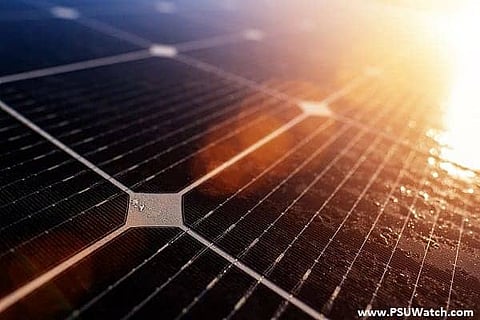
- News Updates
- PSU Watch
- Defence News
- Policy Watch
- हिन्दी न्यूज़
- Jobs Watch
- States News
- Event News

New Delhi: Welcoming the Centre's decision to impose a BCD (Basic Custom Duty) of 25 percent on solar modules imported from China, the renewable energy industry leaders in India have said that the immediate effect of BCD imposition is not going to be visible in the coming 18 months and that more needs to be done to give an impetus to competitive domestic manufacturing in the sector. They also pointed out that because domestic manufacturing is yet to be as competitive as China's, rise in BCD will be accompanied by a rise in tariff as well.
Addressing a webinar organised by JMK Research and Analytics on 'Impact of BCDs on Indian Solar Sector,' Ramesh Nair, CEO of Adani Solar, said that the imposition of BCD needs to last longer, at least for 10 years to let the market grow and mature. He was uncertain as to how long India would take to become competitive with China but assured that with policy push and domestic demand, the process will gain traction. He added that the immediate effect of BCD imposition is not going to be visible in the coming 18 months.
Dr Hitesh Doshi, Chairman and MD of Waaree Group, welcomed the government's move to impose BCD but was uncertain if 25 percent duty was sufficient for the industry to pick up. According to him, a BCD of 25 percent is insufficient to counter 'dumping' by Chinese firms that he said in the past few months alone had led to a 20-25 percent fall in the price of modules imported from China. He reiterated that a duty of around 50 percent for longer period along with some more support system will bring investments into the manufacturing sector. Weighing in on the Doshi's view, Nair agreed that the 25 percent duty was "definitely not enough" and was "miniscule" at today's panel prices, arguing that Chinese manufacturers would be able to sidestep such a small duty by lowering prices.
While noting that domestic manufacturing today is not as competitive as the Chinese, Parag Sharma, CEO of O2 Power, said that a duty of about 40 percent will make more sense for a developer to prioritise domestic content over imports. Also, there is a lack of bankable domestic cell and module manufacturers, said Sharma. He remarked that the tariffs would rise with the imposition of duty and it is unlikely to achieve a tariff as low as Rs 2.36/kWh (which was discovered by SECI recently at a reverse auction for 2 GW solar project) in the near the future. "For every 10 percent rise in BCD, there is a subsequent rise of 10 paisa/kWh in tariff," said Sharma.
On the technology front, Doshi was optimistic that Indian manufacturers have made their space in international markets. He asserted that India right now needs ALMM (Approved list of models and manufacturers) and pass through advantages that Chinese manufacturers are getting in India to achieve a total of 10 GW cell manufacturing and 25-30 GW of modules manufacturing in 2 years. He emphasised that anti- Chinese sentiments across the world can be a benefit for cell and module manufacturers to export (20-25 percent), as domestic demand will take time to pace up.
Commenting on the issue of competitiveness, the Adani Solar CEO said that he was hopeful that within a span of two years, at least 3-4 GW of additional cell manufacturing would come up very rapidly in the country. He dismissed the idea that there is quality issue with domestic manufacturing and stressed that it was only a matter of perception as domestic manufacturers are already exporting to countries like the USA.
(PSU Watch– India's Business News centre that places the spotlight on PSUs, Bureaucracy, Defence and Public Policy is now on Telegram. Join PSU Watch Channel in your Telegram and stay updated)
